,
Elephant Nursery and Landscape Project - Zimbabwe
Giving orphaned elephants a second chance at a life back in the wild
See projectAfrican savannah elephants are the largest land mammals in the world. Females live in family groups of around 10 adults and their calves, while male bulls are either solitary or form bachelor groups, only joining the females for mating.
African savannah elephants cover vast areas, as their movement patterns are influenced by water and food availability. Their roaming habits have a dramatic impact on the landscape and ecosystem around them. As herbivores with large appetites, they consume huge quantities of vegetation, including seeds that they then distribute widely through their feces. This not only helps spread plant species but also provides high-quality fertilizer, which is essential in arid and other terrains.
They also help clear paths, trampling vegetation and overgrown brush as they move across landscapes. This clearing promotes plant biodiversity by allowing sunlight to reach smaller, lower plants that wouldn’t otherwise be able to grow, thus adding to the biodiversity of the system. During dry seasons, African savannah elephants use their tusks and feet to dig deep holes in riverbeds to access water. In the process, they create mini watering holes that many other animals, like zebras, giraffes, and baboons, use as well.
Both plants and animals rely on African savannah elephants for their survival. That’s why it’s so important to protect them.
The scientific name for the African savannah elephant is Loxodonta africana, which is a reference to the oblique shape of their teeth.
According to the IUCN, African savannah elephants are classed as an endangered species. They face human-caused threats, including poaching and habitat loss. They also have low reproductive rates, which makes them more vulnerable to those threats.
African savannah elephants travel widely and live in a variety of habitats. They’re typically found in both open and wooded savannahs but also spend time in deserts and forests. They usually avoid dense tropical forests.
African savannah elephants are found across Africa, though mostly in Southern and East African countries. Large populations are found in Botswana, Kenya, Namibia, South Africa, Tanzania, Zambia, and Zimbabwe.
In total, African savannah elephants are found in 23 countries across the continent.
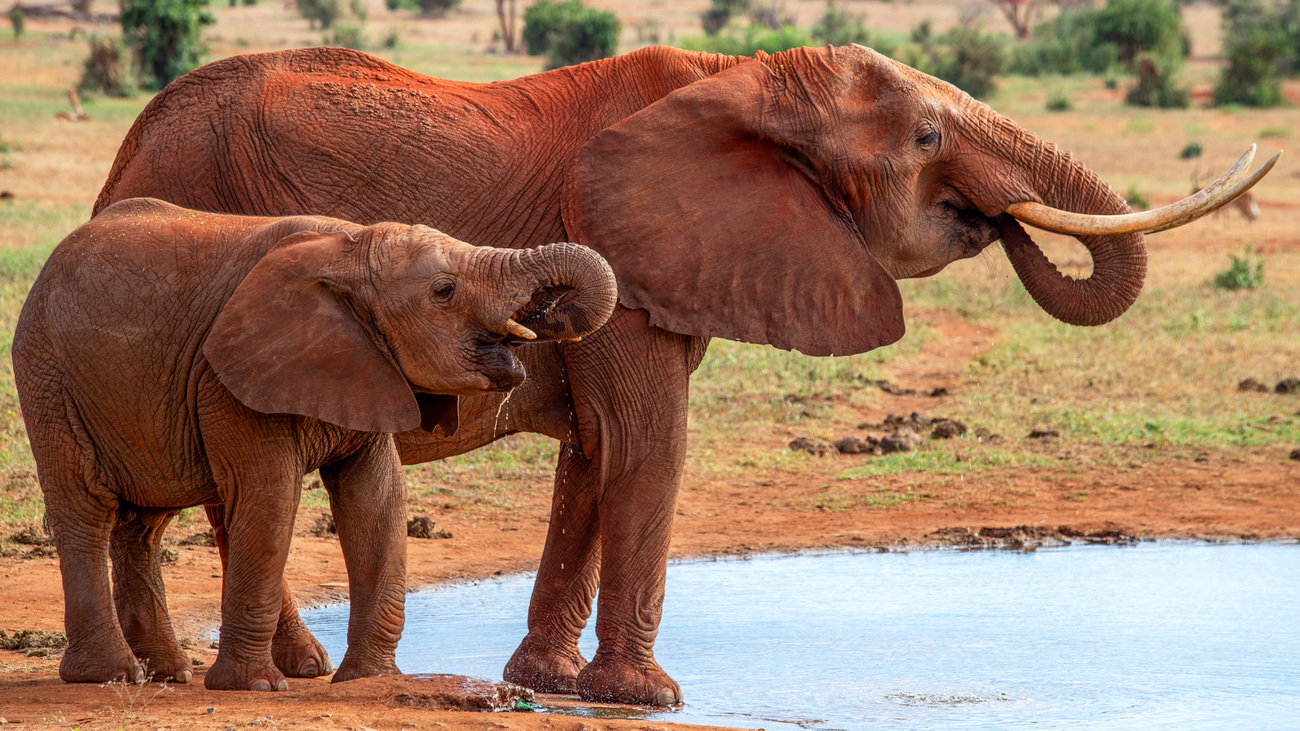
African savannah elephant populations are declining due to a range of threats. Most of these come from human activity, including illegal poaching, habitat erasure, and retaliatory killings.
Poaching is one of the biggest risks to African savannah elephants. They are usually hunted for their ivory tusks, though they have historically also been poached for their meat. While restrictions on international ivory trade have reduced the levels of poaching, they haven’t yet eliminated it. Ivory is still extremely lucrative, and the black market for elephant tusks remains attractive to poachers.
Poaching hasn’t just had a consequence on the number of African savannah elephants left in the wild; it has also altered their genetics. Because poachers target elephants for their tusks, those who never developed tusks and carry the tuskless gene are more likely to survive and reproduce. Female African savannah elephants are now less likely to have tusks than in the past. It’s not clear what effects this artificial selection might have on the species, but we do know that tusks evolved from teeth because they gave elephants an evolutionary advantage. They’re used for digging, lifting objects, gathering food, stripping bark from trees to eat, and defense. Without them, African savannah elephants could struggle to survive.
The African savannah elephant must also contend with widespread habitat loss and fragmentation.
As the largest land mammals in the world, it’s no surprise that African savannah elephants roam widely to find the food and water they need. They typically have ranges of over 30,000 square kilometers and, as such, need continuous territory to be able to range without interference from humans. However, as human populations expand, elephant territories are repurposed for human habitation, agriculture, and industry, thus reducing and fragmenting the elephants’ habitat. This makes it more difficult for them to find water, food, and mates, decreasing the population’s overall health.
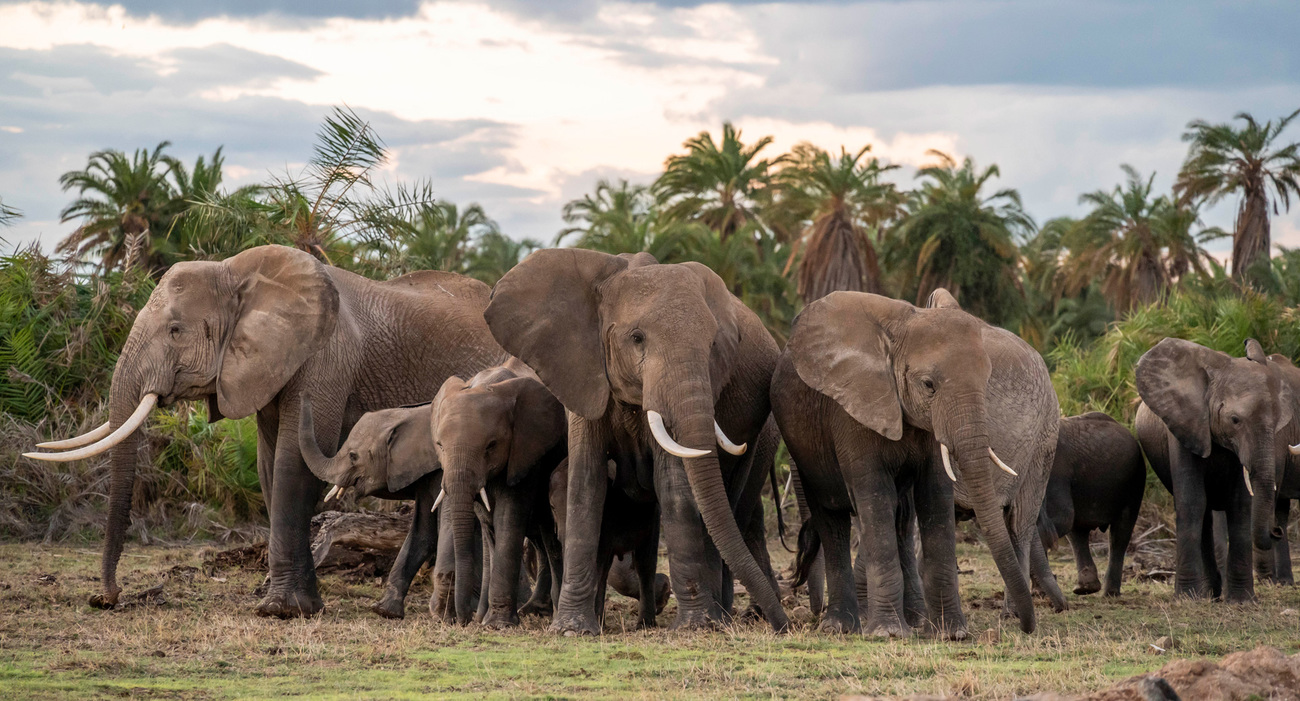
Many people live in elephant range countries—countries where elephants roam. As some of the world’s most marginalized people, they often find themselves competing with local wildlife for land, food, water, and other natural resources; they are also often unaware of their own encroachment onto the habitat of elephants and other wildlife.
Elephants increasingly find their home ranges cut off by new villages, farms, cities, highways, or industrial growth such as mining. Things like fences and train tracks force them to travel longer distances and risk injury. The land where they once foraged is now planted with crops for people and accessing watering holes leads them into increasing contact with villagers.
As climate change brings rising temperatures and changing rainfall patterns, those resources become even more scarce, and elephants get pushed into new areas. Forests begin to disappear, and humans face their own challenges as they must wander deeper into elephant territory to collect water or firewood. The competition becomes fierce and life-threatening—for people and wildlife.
Even in optimal conditions, African savannah elephants reproduce very slowly. Not only do they have a gestational period of 22 months (which is the longest of any known animal) but they also only give birth to one calf per pregnancy and conceive every three to nine years. This very low reproduction rate means that it is difficult for elephant populations to recover.
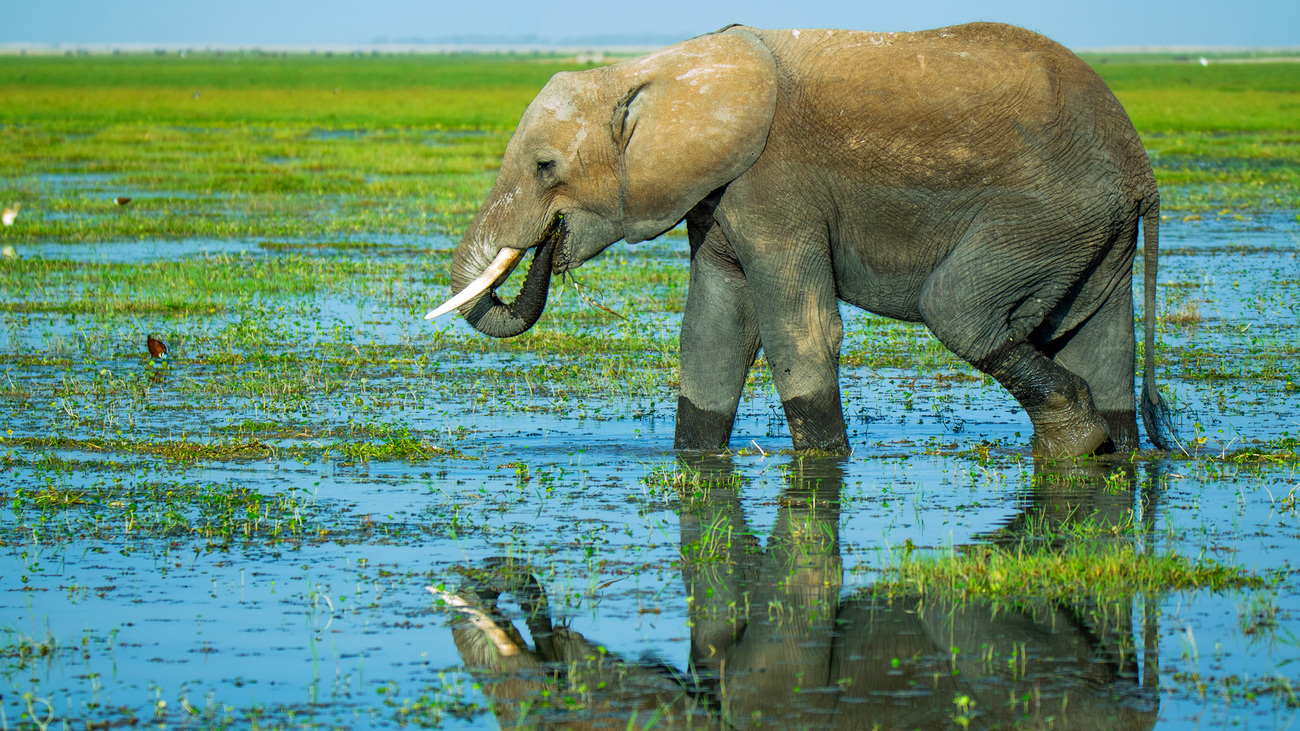
Elephants are the largest land mammals in the world and African savannah elephants are the largest species of elephant. Adult males can weigh up to 6,800 kilograms. Even newborn African elephants can weigh as much as 90 kilograms.
African savannah elephants are classed as endangered by the IUCN. This is mostly due to poaching, but they are also vulnerable to habitat loss and human-elephant conflicts.
As mentioned, African savannah elephants are the largest land animals. They can span nine meters from trunk to tail and reach as tall as four meters at the shoulder.

African savannah elephants are long-lived. In the wild, they can have a natural lifespan of up to 70 years.
Female African savannah elephants usually have tusks. Previously, only around 2% of female African elephants were tuskless. However, the number of tuskless elephants has risen dramatically (by as much as 51% in some areas) as a consequence of poaching.
African savannah elephants are herbivores and need to eat around 160 kilograms of food per day. Their primary food sources are grasses, especially during the rainy season, but they also eat leaves, bark, roots, and fruit, such as mangoes and figs.
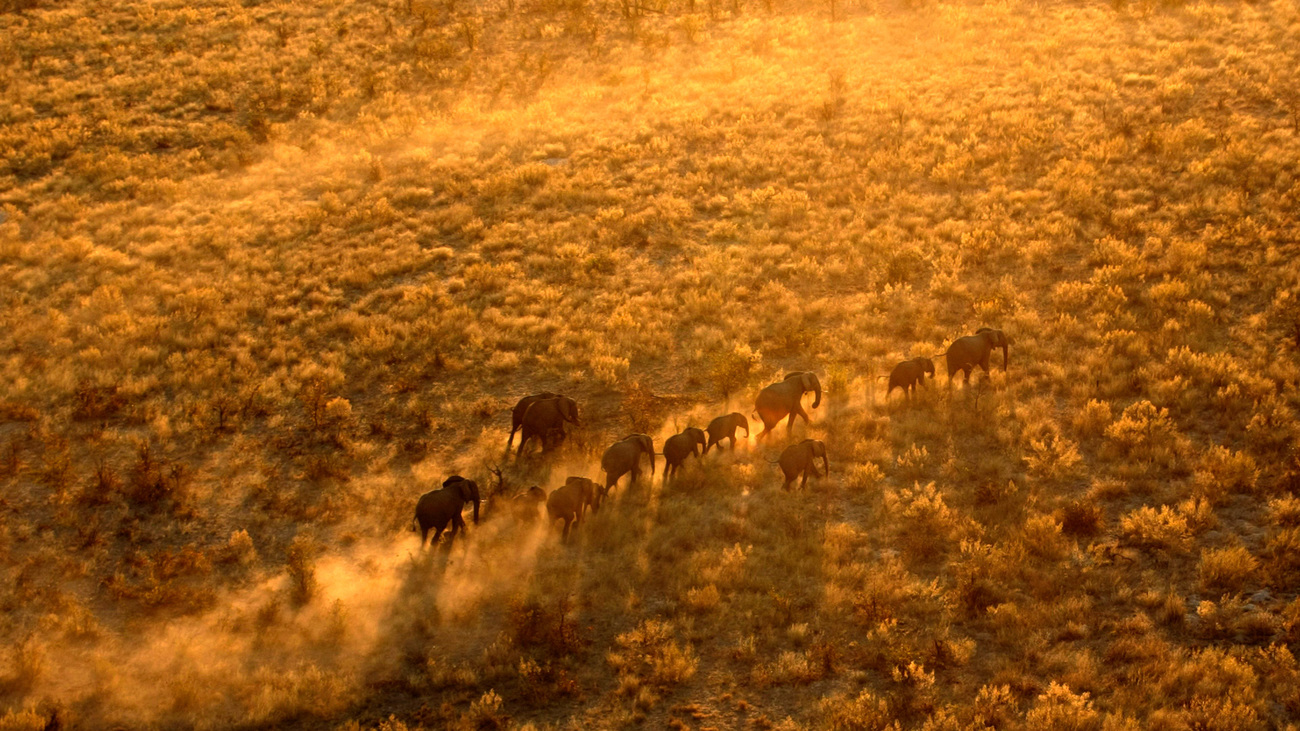
Very few animals can prey on a fully-grown adult elephant, especially when they are travelling in a herd. A pride of lions will sometimes attempt to hunt an elephant, but this only occurs in extreme circumstances.
However, baby elephants are more vulnerable and likely to be hunted by lions, hyenas, and crocodiles. That’s why they stay close to the herd until they reach adulthood.
There are two types of African elephants: the African savannah elephant and the African forest elephant. Combining both species, there were around 415,000 African elephants left in the wild as of 2016. Worryingly, surveys suggest that this number is decreasing.
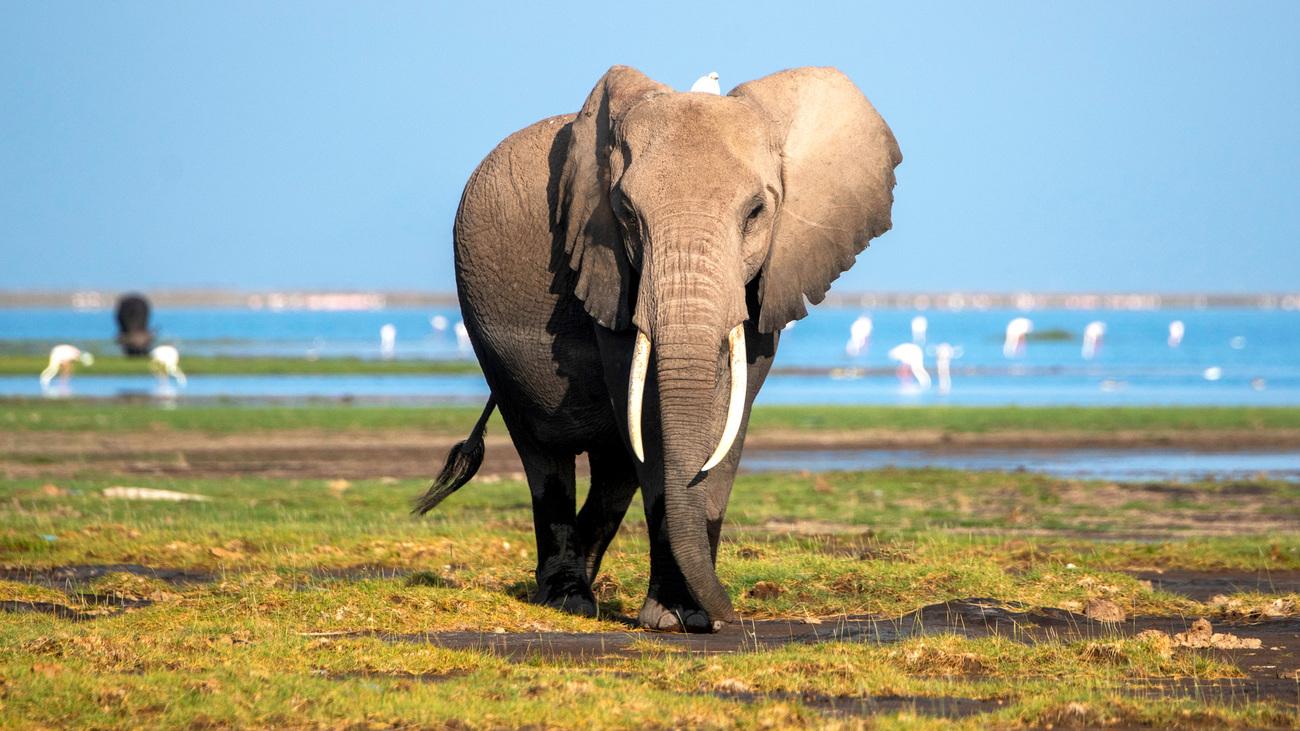
IFAW’s Room to Roam initiative is a new and visionary approach to conservation in Africa, with elephants and people leading the way. Backed by 20 years of science, fieldwork, and engagement with local communities, Room to Roam will ensure the persistence of viable and stable elephant populations long into the future. By securing and connecting habitats and by bringing people together, we will create safe passages for elephants and other wildlife to move freely within their home ranges of East and Southern Africa. The result is greater biodiversity, a natural resilience to climate change, and a future where animals and communities will not only coexist but thrive.
We aim to support elephant population stability and resilience over time. We achieve this through connectivity and minimizing costly and unsustainable human management of elephant populations.
● Support rangers: Ranger welfare is an important part of the support IFAW offers. Rangers need training, they need to be provided with housing in remote locations for field deployments, they need vehicles to patrol protected areas and buffer zones, and they need provisions and equipment to protect wildlife from poachers. Increasing the patrol areas requires more rangers.
● Empower community: Scale our proven community partnership model to lease and secure new wildlife pathways; provide scholarships and income-generating activities. Engage the community in natural resource management for ecosystem health and as an economic driver.
● Revitalize parks: Improvements to make parks and protected spaces more animal and tourist friendly will help the vitality of animal populations and the local economies. Environmentally friendly roads, increased access to water for wildlife, and comfortable safari tourism amenities are needed.
● Rescue and rewild: Individual elephants matter for the survival of the species. Expand the rescue centers in Zimbabwe and Zambia to help more orphaned calves grow up. Support the monitoring of animals after re-wilding to ensure their safety. Conduct regular aerial censuses to assess population health.
Are you as passionate about protecting elephants as we are? Donate today.
,
Elephant Nursery and Landscape Project - Zimbabwe
Giving orphaned elephants a second chance at a life back in the wild
See projectLusaka Elephant Nursery - Zambia
Orphaned elephants need a new herd and a new home
See project, ,
Protecting the Malawi-Zambia Landscape
Habitats cross borders—so do poachers
See projectOur work can’t get done without you. Please give what you can to help animals thrive.
Unfortunately, the browser you use is outdated and does not allow you to display the site correctly. Please install any of the modern browsers, for example:
Google Chrome Firefox Safari